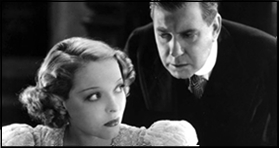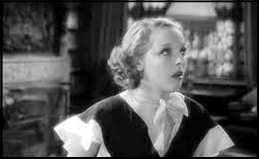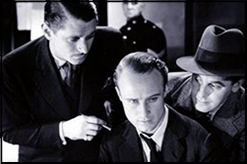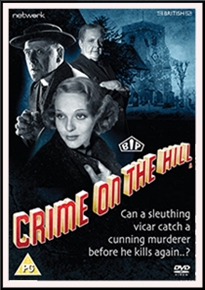Wed 24 Nov 2021
A Movie Review by David Vineyard: CRIME ON THE HILL (1933).
Posted by Steve under Mystery movies , Reviews[6] Comments
CRIME ON THE HILL. British International Pictures, UK, 1933. Sally Blane, Sir Nigel Playfair, Lewis Casson, Phyllis Dare, Anthony Bushell. Screenplay by Vera Allison, E. M. Delafield, Bernard Vorhaus, Michael Hankinson. Based on a play by Jack Celestin and Jack DeLeon. Directed by Bernard Vorhaus.

This little sleeper does show its age, but is a handsomely shot and intelligent old fashioned Golden Age fair play mystery with several nice touches that add up to a fairly taut and effecting ending and a genuine Great Detective moment done as nicely as I have ever seen, as a series of rapid flashbacks point out the things we may have missed or failed to properly give weight to, rather than a talky boring rehash of the case at a gathering of suspects.
The fact that this is based on a play and not a book is probably to its great advantage, as the dialogue is fairly sharp, and all the cues are hit on time.
The squire of a tidy little English village dies leaving his estate to his American ward Sylvia Kennett (Sally Blane), but from the start things start to go bad. Sylvia’s boyfriend Tony Fields (Anthony Bushell) won’t marry her because she is now rich, and then attractive middle aged friend Claire Winslow (Phyllis Dare) shows up with evidence she and the Squire were married, making her the heir.

That’s no problem for Sylvia who can now marry Tony, but he still seems reluctant and is hiding something to do with the attractive maid.
Worse yet, the villagers are gossiping suggesting murder even though the Squire was being treated by Dr. Moody (Sir Nigel Playfair) for a terminal heart condition, and eventually the gossip gets bad enough Scotland Yard shows up with an exhumation order, the result of which shows the Squire was poisoned, the doctor missing it because his heart medicine had a small amount of cyanide in it.
Now unpleasant truths start coming out, and in short order Tony Fields finds himself arrested, tried, and convicted of murdering the old man, and as for the maid who was going to tell the police something when she was killed, it turns out she had his baby before he went off to University.
Detective work here is in the hands of Vicar David Grey (Lewis Casson), hunting and fishing buddy of Dr. Moody, and an old friend of the family. Upset that his little demi Paradise is concealing murder and other darker sins, the Vicar finds himself playing reluctant sleuth when a passing remark by a visitor at the Manor during a local open house accompanying a yearly charity affair puts him on the path to the shocking and unsettling truth about the Squire and his murder.

Replete with red herrings, colorful characters, alcoholic reporters, sensational headlines, flustered Scotland Yard men, dark secrets, darker revelations, a not too intrusive romance with a more interesting than usual couple, and a fine final set piece and beautifully shot little coda at the end this is an outstanding example of the form, and frankly works better and holds the interest better than many a better known mystery adaptation.
Bernard Vorhaus’s direction and cinematography by Claude Friese-Greene are both outstanding. A nightmarish fair ground is a particularly good set piece.
Only running an hour and three minutes, this one is well made with imaginative use of camera angles, camera tricks, and shadows to heighten the effect and dramatize the proceedings. The acting is better than usual and Casson as the unworldly but canny Vicar and Playfair his cynical medical friend are outstanding in what could easily have been merely comedy relief or preachy roles.
The final scene has real power, is imaginatively shot, and will hold the attention of even the most jaded mystery viewer.
You might find yourself comparing it to Marjorie Allingham’s Tiger in the Smoke in its portrayal of a truly good, but still interesting man confronted by human evil without losing his faith. I would have loved to have seen a Father Brown movie this well done.

November 24th, 2021 at 1:23 pm
Sally Blane was my personal favorite in a quite a group of talented, great-looking sisters.
November 24th, 2021 at 8:39 pm
Unfortunately since Sally Blane was little more than a name to me, I had of course to look her up. Wikipedia says:
“She was the sister of actresses Polly Ann Young and Loretta Young, and the half-sister of Georgiana Young, who was the wife of Mexican actor Ricardo Montalban.”
She also made over 100 movies, with her career spanning from 1917 to 1955.
But as far as I’ve discovered so far, she was no relation to Torchy Blane.
November 24th, 2021 at 11:09 pm
Sally Blane had a respectable acting career, albeit mostly in “B” movies. She married Norman Foster, the former actor who directed many of the late ’30s Charlie Chan and Mr. Moto films. I had the great pleasure of meeting her in 1992.
Bernard Vorhaus was American but directed a number of excellent if cheaply produced British films in the mid ’30s. Another good one, made around the same time as HILL, was THE GHOST CAMERA, which starred Ida Lupino just before she migrated to Hollywood. Perhaps the best of the bunch was THE LAST JOURNEY (1935), in which a distraught locomotive engineer decides to kill himself by letting his train run wild with the intent of crashing it, unbeknownst to his passengers. This film brought Vorhaus to the attention of Republic Pictures president Herbert J. Yates, who hired him. Most of his Republic films were okay but no great shakes, the exception being AFFAIRS OF JIMMY VALENTINE (1942), which had trappings of the emerging noir style (thanks also to the cinematography of John Alton, who would later photograph several outstanding noirs).
November 25th, 2021 at 11:43 am
Bernard Vorhaus is another name that was new to me. Thanks, Ed!
November 28th, 2021 at 7:25 am
This sounds good. I must definitely check it out.
January 13th, 2022 at 10:41 am
Your reference to Tiger in the Smoke decided me. I’ll be having as look. Thanks!